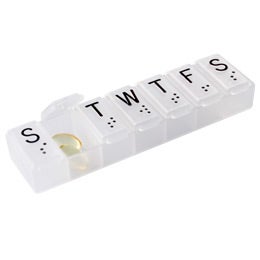Part of bulking up my anti-migraine arsenal involves supplements--vitamins/minerals I take daily to keep my levels correct. Individuals with migraines are more succeptible to B vitamin deficiencies as well as a magnesium deficiency. I've added both to my daily intake. I invested 99 cents in one of these bad boys:

Nossir, they're not just for grandparents anymore.
However, even with this handy sorter, I can forget to refill each day, so I keep the bottles of vitamins in my bathroom medicine cabinet where I'm bound to run into them while reaching for the toothpaste. The more visual reminders I can have, the better. Instead of filling for the week on Sunday, I usually fill it day by day, first thing in the morning. Don't ask me why. Sometimes I like to take the long way around.
What's in my caddy:
Super B-complex vitamin - vitamin B1, B2, B3, B5, B6, B7, B9, B12. Health benefits are linked to the immune and nervous system, and they also support energy growth in cells. B vitamin supplements definitely give me more energy, and they cut through that daily low headache I tend to get. It also makes your pee super-yellow.
Biotin - though I have stopped taking this since I started the Super B--Biotin is another name for B7, so I'm already getting some of that. Promotes healthy skin, nail and hair growth.
Magnesium - Now, magnesium is the supplement I just started taking, and I'm already finding that I need to tweak how I go about it. Research shows that magnesium levels affect serotonin and NMDA receptors in the brain--both are involved with migraines in some fashion. Here's some numbers:
It is responsible for over 300 essential metabolic reactions in the body. It is required for synthesizing proteins in the mitochondria, the metabolic powerhouses of your cells, and for generating energy in most of the body’s basic cellular reactions. It is necessary for several steps in the synthesis of DNA and RNA. Magnesium is also present in a number of other important enzymes. As important as it is intracellularly, 60% of the body’s magnesium is present in bone, and 27% in muscle. -(migrainesurvival.com)
And I just found out that it's best to take this with calcium, so there's another supplement to add to my trusty caddy. Magnesium is also found in certain foods such as spinach, kiwi, brown rice, raisins, beet greens, tomato paste. Another thing magnesium does? Helps with constipation. In other words, the mag helps ya poop. This is another reason to wean myself off caffeine as well--caffeine decreases the amount of magnesium absorbed in the digestive track. Another fun little fact: if you drink a lot of coffee, you probably have a magnesium deficiency for this very reason. How to fix that? Eat more foods rich in magnesium. This is a part of my diet I am certainly struggling with, as soda and coffee provide me with some warped sense of comfort left over from my younger years. I'm slowly cutting away at my intake--key word being slowly, as I'm quite afraid of caffeine withdrawal headaches(I get enough of them...I really don't need to add another type to the bin).
A few things I am preparing to add to my daily intake:
Butterbur - Butterbur is a herb that, according to some researchers, may cut short the duration and intensity of migraine attacks. Info:
Migraine incidence decrease ranged from 37% - 62% among analysis participants, with approximately no side effects. The only offshoot stated was slight gastrointestinal upset, and that was in a little part of both the herb and placebo groups. - articlesolve.com, "Migraine Busting Butterber"
More thoughts on this after I start taking it.
Feverfew - Feverfew has been used traditionally to treat headaches. It's a member of the sunflower family(this random fact tickled me for some reason). Also:
Another study found that people who took a carbon dioxide extract of feverfew had fewer average number of migraine attacks per month compared to people who took placebo. A 3-month study with 49 people found that a combination of feverfew, magnesium, and vitamin B2 led to a 50% decrease in migraine attacks.
Source: http://www.umm.edu/altmed/articles/feverfew-000243.htm#ixzz2Ku8XXfP9
Up next, more on my diet/food intake. What I'm taking out, what I'm adding, and what(if anything) I've learned so far.
No comments:
Post a Comment